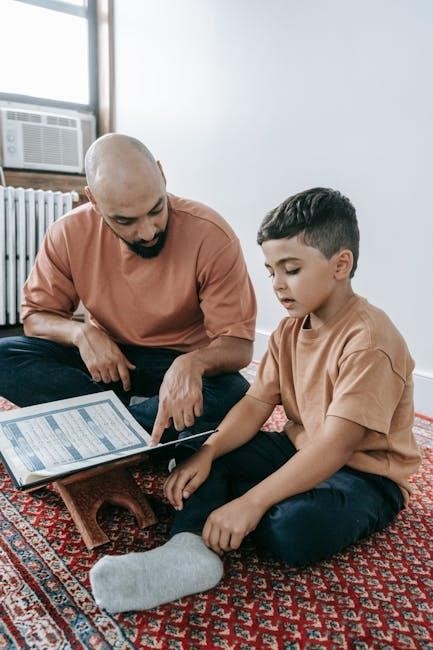family roles pdf
Family roles involve various responsibilities, with
definitions
and expectations, influencing individual behaviors and relationships within the family unit, shaping overall family dynamics and interactions, every single day always.
Definition of Family Roles
Family roles are defined as the patterns of behavior, expectations, and responsibilities associated with each member of a family. These roles are shaped by various factors, including cultural norms, personal values, and individual characteristics. The definition of family roles is complex and multifaceted, involving various aspects of family life, such as emotional support, financial provision, and childcare. In the context of family roles, each member is expected to fulfill certain responsibilities and behave in ways that are consistent with their designated role. The definition of family roles is also influenced by the social and economic environment in which the family lives. Overall, the definition of family roles provides a framework for understanding the complex dynamics of family relationships and the ways in which family members interact with each other. By examining the definition of family roles, we can gain a deeper understanding of the ways in which families function and the challenges they face. Family roles are a crucial aspect of family life, and their definition is essential for building strong and healthy family relationships.

Types of Family Roles
Family roles include parental, sibling, and caregiver roles, shaping family dynamics and interactions, influencing individual behaviors and relationships, every single day always with different responsibilities.
The Enabler Role
The enabler role is a common family role where an individual provides assistance to a family member with problematic behavior, often to feel self-worth by being needed. This role can be harmful as it prevents the person with problematic behavior from realizing the negative effects of their actions. The enabler may continue trying to fix others and has an overall sense of responsibility for the problems of others. In adulthood, the enabler may struggle with setting boundaries and prioritizing their own needs. The enabler role can be seen in families where one member is struggling with addiction or mental health issues. The enabler may provide financial or emotional support, but this can perpetuate the problematic behavior. It is essential to recognize the enabler role and its potential harm to promote healthy family dynamics and encourage individuals to take responsibility for their actions. Family members can work together to establish boundaries and encourage positive change.
The Parentified Child Role
The parentified child role is a family role where a child takes on excessive responsibilities, often caring for their parents or siblings. This role can be stressful and affect the child’s emotional and psychological development. The parentified child may feel responsible for solving family problems and managing household tasks. They may also experience anxiety, depression, and low self-esteem due to the weight of their responsibilities. In some cases, the parentified child may struggle with setting boundaries and prioritizing their own needs. Family members can recognize the parentified child role by looking for signs such as excessive responsibility, emotional distress, and lack of childhood experiences. It is essential to address this role and provide support to the child to prevent long-term effects. By acknowledging the parentified child role, families can work together to redistribute responsibilities and promote a healthier family dynamic. This can involve seeking professional help, such as therapy, to address underlying issues and develop more effective coping strategies.

Importance of Family Roles and Responsibilities
Family roles and responsibilities are crucial for a functional family unit, promoting stability and harmony among members, every single day always with love and care from parents.
Roles and Responsibilities in the Family
Family members have various roles and responsibilities, with each person contributing to the overall well-being of the family unit. The roles and responsibilities of family members are defined by their position within the family, such as parent, child, or sibling. Parents are typically responsible for providing care and support to their children, while children are expected to obey and respect their parents. Siblings also have roles and responsibilities, such as supporting and caring for each other. In addition to these basic roles, family members may also have other responsibilities, such as household chores or financial contributions. Effective communication and cooperation are essential for fulfilling these roles and responsibilities, and for maintaining a harmonious and functional family unit. By understanding and fulfilling their roles and responsibilities, family members can work together to create a positive and supportive family environment. This can have a positive impact on the physical, emotional, and social well-being of all family members.
Evaluating Family Relationships
Evaluating family relationships involves assessing the interactions and dynamics between family members. This can be done by observing communication patterns, conflict resolution strategies, and emotional support networks. Family members can evaluate their relationships by considering factors such as trust, respect, and empathy. They can also reflect on their own behaviors and attitudes, and how these may be impacting their relationships with others. By evaluating family relationships, individuals can identify areas of strength and weakness, and develop strategies for improvement. This can lead to more positive and supportive relationships, and a more harmonious family environment. Effective evaluation of family relationships can also help to prevent conflicts and problems, and promote overall family well-being. Furthermore, evaluating family relationships can help individuals to develop a greater understanding of themselves and their place within the family unit, leading to increased self-awareness and personal growth, and more effective communication and cooperation.

on Family Roles

Family roles are essential, shaping individual behaviors, with
responsibilities
influencing overall family dynamics, every single day always matters.
Analyzing Family Dynamics
Analyzing family dynamics involves examining the interactions and relationships within a family, including the roles and responsibilities of each member. This can be done by observing how family members communicate, resolve conflicts, and make decisions. By analyzing these dynamics, individuals can gain a better understanding of their own family’s strengths and weaknesses, as well as identify areas for improvement.
Using tools such as family diagrams or genograms can help to visualize the relationships and patterns within a family, making it easier to identify potential issues or areas of concern. Additionally, considering the cultural and societal context in which a family operates can provide further insight into the dynamics at play.
Overall, analyzing family dynamics is an important step in understanding the complex and often nuanced relationships within a family, and can be a valuable tool for individuals seeking to improve their own family’s functioning and overall well-being, and to make a positive impact on their loved ones.